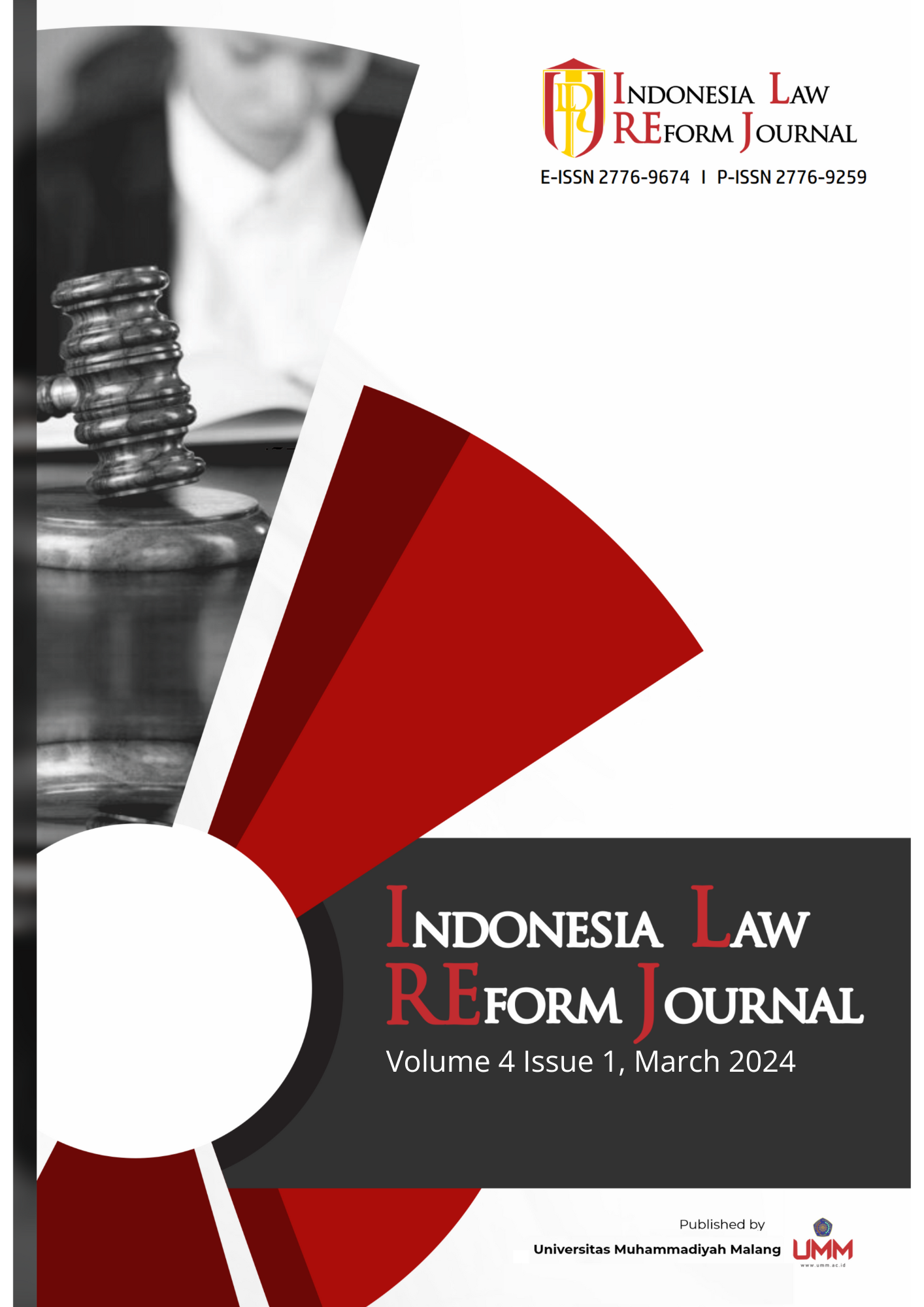Comparison of Dispute Resolution in General Elections in Indonesia and Thailand
DOI:
https://doi.org/10.22219/ilrej.v4i1.34868Keywords:
Comparasion, General Election, Dispute Resolution, Indonesia, ThailandAbstract
The history of general elections in Indonesia began in 1955 with the implementation of a Proportional Representation system, allowing voters to directly elect candidates or parties. This system underwent modifications over time, including the adoption of an open-list system in 2004. The enactment of Law No. 7 of 2017 subsequently regulated the conduct of general elections in Indonesia, emphasizing principles such as direct, general, free, secret, fair, and honest elections. In Thailand, the history of general elections commenced following the 1932 revolution that ended absolute monarchy. Despite this, Thailand has experienced numerous military coups affecting its political dynamics, notably in 2006 and 2014, sparking debates among opposing political factions. This study employs a normative and legal approach to analyze the dispute resolution systems of general elections in Indonesia, contrasting them with Thailand's specialized commission approach for similar matters. In Indonesia, the resolution of election disputes is governed by Law No. 7 of 2017, with oversight bodies including the General Election Commission and the Election Supervisory Board. Conversely, Thailand's Election Commission of Thailand plays a crucial role in resolving election disputes in accordance with the constitution. Both countries adopt different approaches in handling election disputes; Indonesia relies on judicial bodies such as the Administrative Court and the Supreme Court, whereas Thailand employs the Election Commission of Thailand as a non-judicial institution with broad authority in addressing electoral law violations.
Abstrak
Sejarah Pemilihan Umum di Indonesia dimulai pada tahun 1955 dengan menggunakan Sistem Proporsional, di mana pemilih dapat memilih calon secara langsung atau partai. Sistem ini mengalami modifikasi dari waktu ke waktu, termasuk penerapan stelsel daftar terbuka pada tahun 2004. Undang-Undang No. 7 Tahun 2017 kemudian mengatur pelaksanaan pemilihan umum dengan prinsip-prinsip seperti langsung, umum, bebas, rahasia, jujur, dan adil. Di Thailand, sejarah pemilihan umum dimulai setelah revolusi tahun 1932 yang mengakhiri monarki absolut. Meskipun demikian, Thailand mengalami banyak kudeta militer yang mempengaruhi dinamika politiknya, termasuk kudeta pada tahun 2006 dan 2014 yang melibatkan perdebatan antara faksi-faksi politik yang berseberangan. Penelitian ini menggunakan pendekatan normatif dan perundang-undangan untuk menganalisis sistem penanganan sengketa pemilihan umum di Indonesia, dibandingkan dengan Thailand yang memiliki pendekatan komisi khusus untuk hal serupa. Penyelesaian sengketa pemilihan umum di Indonesia diatur dalam Undang-Undang No. 7 Tahun 2017, dengan badan penyelesaian termasuk Komisi Pemilihan Umum dan Badan Pengawas Pemilihan umum. Di Thailand, Election Commission of Thailand memiliki peran penting dalam menyelesaikan sengketa pemilihan umum sesuai dengan konstitusi. Kedua negara memiliki pendekatan yang berbeda dalam menangani sengketa pemilihan umum, Indonesia melalui badan peradilan seperti Pengadilan Tata Usaha Negara dan Mahkamah Agung, sedangkan Thailand melalui Election Commission of Thailand sebagai lembaga non-peradilan yang memiliki kewenangan luas dalam menangani pelanggaran undang-undang pemilihan umum.
Downloads
References
Aermadepa, Aermadepa. “Penyelesaian Sengketa Proses Pemilu Oleh Bawaslu, Tantangan Dan Masa Depan.” Jurnal Justitia: Jurnal Ilmu Hukum dan Humaniora 1, no. 2 (2019): 1–14.
Amrullah, Fahrin. Konsep Ideal Penyelesaian Sengketa Pemilihanumum di Indonesia Yang Berbasis Nilai Keadilan. ProQuest Dissertations Publishing, 2021.
Bancin, Rajis, dan Muhammad Syafii Sitorus. “Kunci Keberhasilan Menyongsong Pemilihan Serentak 2024 Menuju Indonesia Berkemajuan.” Jurnal Bakti Sosial 2, no. 1 (2023): 1–10.
Bisariyadi, Bisariyadi, Anna Triningsih, dan Meyrinda Rahmawaty. “Komparasi mekanisme penyelesaian sengketa pemilu di beberapa negara penganut paham demokrasi konstitusional.” Jurnal Konstitusi 9, no. 3 (2012): 531–62.
Chalermpalanupap, Termsak. “2023/24 ‘What’s Interesting about the Thai General Election is not Who Wins but What Comes After’ by Termsak Chalermpalanupap,” 2023. https://www.iseas.edu.sg/category/media/page/352/articles-commentaries/iseas-perspective/page/13/.
Chambers, Paul. “Arch-Royalist Autocracy Unlimited: Civil-Military Relations in Contemporary Thailand.” Dalam Rights and Security in India, Myanmar, and Thailand, disunting oleh Chosein Yamahata, Sueo Sudo, dan Takashi Matsugi, 193–217. Singapore: Springer Singapore, 2020. https://doi.org/10.1007/978-981-15-1439-5_11.
Dressel, Björn. “Governance, Courts and Politics in Asia.” Journal of Contemporary Asia 44, no. 2 (3 April 2014): 259–78. https://doi.org/10.1080/00472336.2013.870827.
Ellis, Andrew. “Indonesia: Transition and Change but Electoral System Continuity.” Dalam The Handbook of Electoral System Choice, disunting oleh Josep M. Colomer, 497–511. London: Palgrave Macmillan UK, 2004. https://doi.org/10.1057/9780230522749_29.
Farrelly, Nicholas. “Why Democracy Struggles: Thailand’s Elite Coup Culture1.” Australian Journal of International Affairs 67, no. 3 (Juni 2013): 281–96. https://doi.org/10.1080/10357718.2013.788123.
Harding, Andrew, dan Peter Leyland. “The Constitutional Courts of Thailand and Indonesia: Two Case Studies from South East Asia.” J. Comp. L. 3 (2008): 118.
Hewison, Kevin. “Thaksin Shinawatra and the Reshaping of Thai Politics.” Contemporary Politics 16, no. 2 (Juni 2010): 119–33. https://doi.org/10.1080/13569771003783810.
Jarenpanit, Thannapat. “Love, Anger and Hate of the Red Shirts: The Contestation of Meanings of Politics and Justice.” Thammasat Review 20, no. 2 (2017): 103–24.
Jotikut, Ram. “A Brief History of Protest Politics in Thailand (2001–2014).” Political Science and Public Administration Journal 7, no. 2 (2016): 79–117.
Kawanaka, Takeshi. “The stakes of politics and electoral administration: a comparative study of Southeast Asian democracies.” IDE Discussion Paper 536 (2015). https://ir.ide.go.jp/record/37643/files/IDP000536_001.pdf.
Kim, Byung-Kook, dan Ezra F. Vogel, ed. “Chapter Three. State Building: The Military Junta’s Path to Modernity through Administrative Reforms.” Dalam The Park Chung Hee Era, 85–112. Harvard University Press, 2011. https://doi.org/10.4159/harvard.9780674061064.c3.
La Ode Hermanto, Wahyu Prianto. “Analisis Penyelesaian Sengketa Pemilihan Umum Oleh Badan Pengawas Pemilihan Umum Kota Kendari Pada Tahun 2019.” Jurnal Ilmu Sosial Dan Pendidikan 2, no. 1 (2024): 20–30.
Lesen, Kausar Jumahir, Muhtadi Muhtadi, dan Martha Riananda. “The Code of Ethics and Disciplinary Management of Political Parties Member.” Constitutionale 3, no. 2 (2022): 161–76.
Leyland, Peter. “Constitutional Design in Thailand: the Management of Electoral Process in an Emergent Democracy.” The Journal of Parliamentary and Political Law 4, no. 2 (2010): 299–321.
———. “Thailand’s constitutional watchdogs: dobermans, bloodhounds or lapdogs.” J. Comp. L. 2 (2007): 151.
Mashdurohatun, Anis, Erman Suparman, dan I. Gusti Ayu Ketut Rachmi Handayani. “Authority of the Constitutional Court in the Dispute Resolution of Regional Head Elections.” Lex Publica 6, no. 1 (2019): 52–60.
Maulana AR, Akmal. “Pengaruh Gerakan Mahasiswa Terhadap Upaya Penegakan Demokrasi di Thailand Pada Masa Pemerintahan PM Prayuth Chan-Ocha (2014-2020).” PhD Thesis, Universitas Islam Indonesia, 2022. https://dspace.uii.ac.id/handle/123456789/38467.
Michaels, Ralf. “The functional method of comparative law.” The Oxford handbook of comparative law 2 (2006): 345–89.
Milenia, Luh Yossi Shuartini. “Peran Hukum Tata Negara (Studi Kasus Pemilihan Umum di Indonesia).” Jurnal Media Komunikasi Pendidikan Pancasila dan Kewarganegaraan 3, no. 2 (2021): 65–76.
Mulyono, Galih Puji, dan Rizal Fatoni. “Demokrasi sebagai wujud nilai-nilai sila keempat Pancasila dalam pemilihan umum daerah di Indonesia.” Citizenship Jurnal Pancasila dan Kewarganegaraan 7, no. 2 (2020): 97–107.
Mutawalli, Muhammad. “Legislative Elections: An Overview of Close Proportional System.” PETITA 8 (2023): 93.
O’Connor, Andrew C. “Why Thailand’s military stepped in.” PhD Thesis, Monterey, California. Naval Postgraduate School, 2011. https://core.ac.uk/download/pdf/36699491.pdf.
Pahlevi, Indra. “Lembaga penyelenggara pemilihan umum di indonesia: berbagai permasalahannya.” Jurnal Politica Dinamika Masalah Politik Dalam Negeri dan Hubungan Internasional 2, no. 1 (2016). https://dprexternal3.dpr.go.id/index.php/politica/article/view/286.
Pancaningtyas, Nugraheni. “The gender quota, the electoral system and women’s representation in Indonesia: case studies of two district parliaments,” 2015. https://core.ac.uk/download/pdf/156712734.pdf.
Panduprasert, Panuwat. “Legitimacy and military rule in today’s Thailand.” Kyoto Review of Southeast Asia 20 (2017). https://kyotoreview.org/yav/legitimacy-military-rule-thailand/.
Prawira, Syailendra Anantya. “Election violation and election law enforcement in general election in Indonesia.” Jurnal Hukum Volkgeist 4, no. 1 (2019): 25–34.
Putra, Happy Anugraha, dan Anwar Noris. “Lembaga Penyelesaian sengketa Pemilu yang ideal di Indonesia.” DIVERSI: Jurnal Hukum 6, no. 1 (2020): 73–91.
Rannie, Mahesa. “Legal regulations for the general election system in Indonesia from the 1955 election to the concurrent election of 2019.” Nurani: Jurnal Kajian Syari’ah dan Masyarakat 20, no. 2 (2020): 247–64.
Ricks, Jacob I. “Thailand’s 2019 vote: The general’s election.” Pacific Affairs 92, no. 3 (2019): 443–57.
Rikardo, Ofis. “Penerapan Kedaulatan Rakyat Di Dalam Pemilihan Umum Di Indonesia Berdasarkan Undang-Undang Dasar Negara Republik Indonesia Tahun 1945.” Jurnal Hukum Sasana 6, no. 1 (2020): 51–71.
Ririhena, Micael. “Kewenangan Bawaslu Dalam Penyelesaian Pelanggaran Administrasi Pemilu.” Bacarita Law Journal 4, no. 2 (2024): 112–21.
Sensu, La, Guasman Tatawu, Muhammad Sabarudin Sinapoy, Oheo Kaimuddin Haris, Sahrina Safiuddin, dan M. Gafur. “Analisis Kewenangan Adjudikasi Bawaslu dalam Penyelesaian Sengketa Proses Pemilu.” Halu Oleo Legal Research 4, no. 2 (2022): 308–21.
Siani, Edoardo. “Thailand 2019-2021: Military, monarchy, protests.” Asia Maior 32 (2022): 238–57.
Siboy, Ahmad. “Constitutionality of constitutional settlement of disputes for the election of local heads.” Jurnal Cakrawala Hukum 13, no. 2 (2022): 117–27.
Singh, Daljit, dan Malcolm Cook, ed. “Thailand in 2018: Military Dictatorship under Royal Command.” Dalam Southeast Asian Affairs 2019, 327–40. ISEAS Publishing, 2019. https://doi.org/10.1355/9789814843164-021.
Sinpeng, Aim. “From the yellow shirts to the whistle rebels: Comparative analysis of the People’s Alliance for Democracy (PAD) and the People’s Democratic Reform Committee (PDRC).” Dalam Routledge handbook of contemporary Thailand, 145–55. Routledge, 2019. https://www.taylorfrancis.com/chapters/edit/10.4324/9781315151328-11/yellow-shirts-whistle-rebels-aim-sinpeng.
Sitthi, Khajornsak. “Protest, participation and profits: the Redshirt movement in Thailand, 2010-2016.” PhD Thesis, University of Leeds, 2017. https://etheses.whiterose.ac.uk/19359/.
Sombatpoonsiri, Janjira, dan Thammachat Kri-aksorn. “Taking back civic space: Nonviolent protests and pushbacks against autocratic restrictions in Thailand.” Protest 1, no. 1 (2021): 80–108.
Subrahmanyan, Arjun. “The Unruly Past: History and Historiography of the 1932 Thai Revolution.” Journal of Contemporary Asia 50, no. 1 (1 Januari 2020): 74–98. https://doi.org/10.1080/00472336.2018.1556319.
Supriyadi, Dedi, Ende Hasbi Nassaruddin, dan Beni Ahmad Saebani. “Position and Legal Certainty in the Decision of the Honorary Board of Election Organizers (After the Constitutional Court Decision Number 32/PUU-XIX/2021).” West Science Social and Humanities Studies 1, no. 06 (2023): 315–24.
Suwarso, Reni. “Indonesian democracy: the impact of electoral systems on political parties, 1999–2009.” PhD Thesis, Victoria University, 2016. https://vuir.vu.edu.au/31051/3/SUWARSO%20Reni-thesis_nosignature.pdf.
Tan, David. “Metode Penelitian Hukum: Mengupas Dan Mengulas Metodologi Dalam Menyelenggarakan Penelitian Hukum.” Nusantara: Jurnal Ilmu Pengetahuan Sosial 8, no. 8 (2021): 2463–78.
Tonsakulrungruang, Khemthong. “The Constitutional Court of Thailand: From Activism to Arbitrariness.” Constitutional courts in Asia: A comparative perspective, 2018, 184–213.
Viernes, Noah Keone. “Thai street imaginaries: Bangkok during the Thaksin era (2001-2010).” PhD Thesis, [Honolulu]:[University of Hawaii at Manoa],[May 2012], 2012. https://scholarspace.manoa.hawaii.edu/handle/10125/101550.
Wishnu, Dewanto. “Tinjauan Hukum Implementasi Sistem Demokrasi Pancasila Melalui Pemilihan Umum Langsung Di Indonesia.” PhD Thesis, UNIVERSITAS TAMA JAGAKARSA, 2017. http://digilib.iblam.ac.id/id/eprint/153/1/Tesis%20-%20Dr.%20Wishnu%20Dewanto.pdf.
Downloads
Published
How to Cite
Issue
Section
License
Copyright (c) 2024 Darwin Saputra, Amiludin Amiludin, Dwi Nur Fauziah Ahmad; Imran Bukhari Razif

This work is licensed under a Creative Commons Attribution-ShareAlike 4.0 International License.











